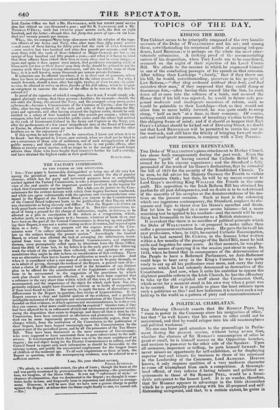THE FACTORY COMMISSION.
TO THE EDITOR OF THE SPECTATOR.
; S1R—Your paper is honourably distinguished as being one of the very few among the periodical press that have ventured, amidst the din of popular clamour, which has for party, and interested purposes been so successfully excited against the Factory Commission, to take a dispassionate and enlightened view of the real merits Of the important question involved in the inquiry for which that Commission was instituted. But while you do justice to the COM.. missioners for the evident fairness with whieli their inquiry has been conducted, and while you agree -substantially with the opinions and recommendations con- tained in the Report of the Central Board, yon impute to the Commissioners of the Central Board indiscreet haste in the publication of that Report, which you characterize as being slovenly and diffuse. That the Report was drawn up with great haste must be evident on.the face of it. But this circumstance, in- stead of being a ground for the charge of indiscretion, ought, in fairness, to be allowed as a plea in exculpation of the defects as a composition which, whether justly. or not, you impute to it ; because, whatever of haste there may have been on the part of the Central Commissioners in drawirie6 up and publish- ing their Report, it was not a matter resting on their discretion, but Impthsed upon them as a duty. The very purpose and the express terms of the Com- mission were t‘ to collect information so as to enable Parliament to legis- late on the subject .during the present session." Accordingly the Central Board, to whom was allotted the task of arranging the infurination, trans- mitted from time to time by the District Commissioners, aud reporting thereon, were peremptorily called upon by directions from the Home Office, dated the 20th of June last, to lay before it in the early part of 'the following week the whole of the evidence then collected, with any opinions or recom- mendations they might be able to form on consideration of that evidence. There was no alternative then but to hasten the publication as much as possible. And when it is considered what a vast mass of evidence was to be gone through, so as to admit of giving, through the medium of the Report, a general view of it— what a choice of difficulties presented itself in the formation of any distinct plan to be offered for the consideration of the Legislature—and what objec- tions to be surmounted in the suggestion of the provisions by which such plan should be rendered effectual, it might have been expected that a reference to the very short time within which all this was, of necessity, to be accompanied, and the importance of the object for which such haste was im- periously enjoined, might have disarmed criticism as to faults of composition, if these were found to exist. But surely, to apply the term of slovenliness and diffusiveness to the Report in question, does savour of hypercriticism. If the Report conveys a clear and faithful analysis of the evidence, and a perfectly intelligible statement of the opinions mind recommendations of the Central Board, founded on that evidence, in which opinions and recommendations, be it observed, that ion concur, what more could reasonably be required ? Greater care, if time had been allowed for it, in refinement of style and conciseness of statement would, seeing the disposition that exists to disparage and decry•all that is done by this Commission' have been considered as affectation and pretension. Nothing in- 'deed Call be more ingeniously perverse, more whimsically unjust, than the charges which, from the institution of the Commission to the publication of their Report, have been heaped 'unceasingly upon the Commissioners by the greatest part of the periodical press' and by all the promoters of the Ten Hours Bill. They have been denounced as the mere creatures of Government ; who were supposed to have nominated them in pure subserviency to the mill- owners. It was trumpeted forth that there was to be the mere semblance of an inquiry ; the real object being for the District Commissioners to collect, and the Central Board to report only such information as should be favourable to the existing system, and Justify the unrestricted employment for the longest hours of children of the tenderest age. To all such imputations as these at least, the Report in question, with the accompanying evidence, may be referred to as a 'sufficient answer.
I am, Sir, your obedient servant, .
PHILO' JUSTITI,E.
[We admit, to it reasonable extent, the plea of haste ; though the haste at the end was partly occasioned by procrastination in the beginning—the procrastina- tion, we imagine, of the Home Office. It was not "refinement of style," or elegance of composition' that we desiderated in the Report ; we thought it some- times faulty in tone, and frequently loose in expression and defective in arrange- ment. However, it will be seen that we have now a graver charge to prefer against the' RepOrt at wlicise door the blame Might finally to rest, we cannot tell. —ED.]


















 Previous page
Previous page